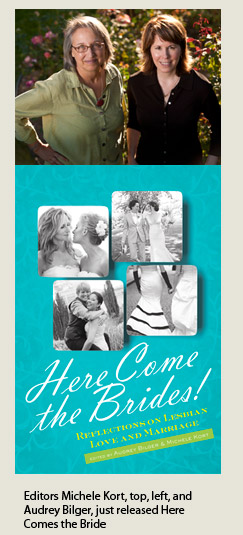 A new book co-edited by CMC's Associate Professor of Literature Audrey Bilger gives "a snapshot of the time we're living in," and tells the stories of lesbians grappling with the issue of marriagewhether they're married, or against marriage, or whether they're hoping at some point to be able to marry.
A new book co-edited by CMC's Associate Professor of Literature Audrey Bilger gives "a snapshot of the time we're living in," and tells the stories of lesbians grappling with the issue of marriagewhether they're married, or against marriage, or whether they're hoping at some point to be able to marry.
"It's really a story about love and relationships," Bilger says of Here Come the Brides (Seal Press, 2012), edited with Los-Angeles based writer and Ms. magazine senior editor Michele Kort. Their collaboration has produced an anthology of first-person stories in essay form, and also one-act plays, cartoons, poems, and photographs of lesbian weddings and married couples, for a multidimensional look at how opening up the traditional order of "man and wife"to include the possibility of "wife and wife"is altering our social landscape.
A forthcoming Library Journal review calls the book "required reading for all students of civil rights and marriage equality."
Bilger, a regular blogger for Ms. magazine, also serves as the faculty director of the Center for Writing & Public Discourse at CMC, and specializes in gender studies, humor, fiction, queer studies, Jane Austen, and women writers.
She and Kort can be seen discussing their new book on YouTube.
The two also will read briefly from Here Come the Brides during a reception hosted by the Gould Center on Thursday, April 12 in the Kravis Board Room (367).
"I think anyone interested in marriage or who's interested in rights and citizenship, will be interested in this book," says Bilger.
On a recent morning, the CMC professor took time to field some additional questions about her book.
CMC: How did you go about soliciting contributors for Here Come the Brides?
Audrey Bilger: We posted calls for contributors on a number of Women's Studies and LGBT listservs and websites, but we also approached particular writers, such as comedians Gloria Bigelow and Monica Palacios (we wanted there to be humor) and Native American marriage equality activist Heather Purser, who just last year helped legalize marriage for same-sex couples in the Washington state Suquamish tribe. We saw a story about Purser in the news, and immediately reached out to ask her to write for us. We also went to the Bay Area to interview Kate Kendell, the executive director of the National Center for Lesbian Rights, in conversation with Phyllis Lyon, a gay civil rights icon, whose marriage to her partner of over fifty years, Del Martin, was the first legal same-sex marriage in the state of California. Ms. Martin passed away just months after the couple married in 2008, making their story a bittersweet one, as are many of those contained in the anthology.
CMC: How long did it take for the book to come together?
Bilger: I first came up with the idea for the book in 2009 and brought Michele Kort on board that summer, so it took about two-and-a-half years to complete the book, from start to finish. I was fortunate to receive support from CMC's Berger Institute for Work, Family, and Children, and this helped move the project along. We ended up with 42 contributors, and the book is almost 450 pages. So editing the selections and working with the authors was incredibly time-consuming. We also worked with photographers to include an array of pictures in the book because we wanted there to be a visual component. And we commissioned two original cartoons, by Jen Sorensen and Amelia Sauter, which add another visual dimension to the collection. Here Come the Brides ended up including two one-act plays, five poems, three cartoons, 19 photos, and 33 essays.
CMC: Would you consider this a bold project, and/or, were there any moments of self-doubt when collaborating on the concept?
Bilger: Given the evolution of the national conversation about same-sex marriage rights in the past decade, this book seems like a completely logical contribution to offer at this moment. Four of our contributors are Canadians, where gay marriage has been legal since 2005, and while we were putting the book together, more places in the U. S. started granting marriage rights to same-sex couples. The book is timely, and it represents a spectrum of gay women's views and voices on marriage equality. These are stories about love, about family, and about community. In one of our selections, contributor Patricia Cronin writes, "Women's history gets erased all the time. Lesbian history is often not written at all." In this anthology, Michele and I make sure that this history does, indeed, get written.
CMC: Why was this book important for you to work on?
Bilger: Marriage equality is one of the most popular civil rights issues in living memory. We've witnessed dramatically positive shifts in the way Americans think about the topic, and Here Come the Brides provides a record of these transformative times.
